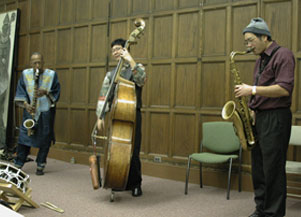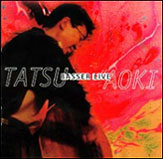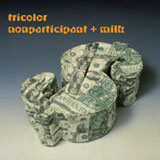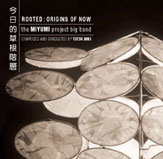

Courtesy of Tatsuo Aoki

Asian Improv Records

Atavistic

Southport
A FIRESIDE
CHAT WITH TATSU AOKI
The
first and only show I went to see during a recent trip to Chicago was
a Fred Anderson show featuring Hamid Drake, Kidd Jordan, and Tatsu Aoki.
And although I was admittedly blown away by Anderson and Drake, it was
Aoki that made the most lasting impression. More so than his playing,
it was his personality. Aoki seemed full of life on the bandstand, a smile
from ear to ear. Aoki has a new trio release with Jo Jarman. Recently
I spoke with the bassist about the album and the music, as always, unedited
and in his own words.
FRED
JUNG: Let's start from the beginning.
TATSU
AOKI: Everybody in my family was an entertainer, dancers of Japanese traditional
dance. My mother still does that. Some taiko drum players, so everybody
in my family was doing something. I started to do this music when I was
very little and not necessarily out of my choice. If somebody asked me
how I got started, it was there with me when I was born. As a teenager,
I was interested in American rock music because I grew up in the traditional
setting, I wanted to do something different. Then I realized that there
is something about the music that people are actually saying something.
So that was like my teens, I think, when I started to hear people talking
with the music and then I thought that this was incredible. So that is
the time that we could express something with the music or express something
with the arts. I think it took the whole teenage period of my life to
realize that.
FJ: Apart from normal teenage angst, what role does individuality play?
TATSU
AOKI: I think individuality, when people actually demonstrate individuality
of the music, they are actually talking about something. They're talking
probably about their life or they are showing you a part of their life
and it is really apparent that people are saying something or doing something
about their lives when they play music. I think a lot of times, what I
wanted to do with the music is that I'm always wanting to tell people
the way it is about things in general, the way it is is one of the most
powerful and one of the most honest of our life. And the music is honest
because you can't really fake all that stuff because number one, you need
to play something and if your playing is just a demonstration of technical
stuff then people would know because there is no feeling into the sounds.
That is what I would like to do, to try to demonstrate the honesty and
the honest part of our lives, telling people exactly the way it is is
actually good.
FJ: There really is no bullshitting with solo recordings and you have
done your fair share of solo sessions.
TATSU
AOKI: I think as long as my feeling is in there, that is pretty much a
decent reason for me to do it. I think my playing, if you compare to some
of the other bass players, I think my playing is not raw and rough. That's
what I want to do with the instrument. As long as I have enough feeling
to play these compositions and improvisational ideas, I think it is good
enough and I believe I can convince people that way.
FJ: How has the AACM model influenced your approach?
TATSU
AOKI: I think the AACM was on my mind when I was younger, especially when
you are younger and you encounter music coming up from them. That was
such a surprise to realize. It was the new way to take this music, especially
when you are listening to swing music and bebop music. It was so, so different
and it was so raw and it was so ethnic and it was so free. It was exciting,
so I think a lot of the stuff that I heard just inspired me that one could
actually do it. Then you go through a period of time where you kind of
imitate all this, imitate and emulate all this and you listen back what
you did and you realize that nothing is really happening. Then you have
to kind of rethink what you are doing based on what the AACM guys are
doing and I realized that I had to reform myself to try and say something
with the music instead of doing something like imitating something.
FJ: Thus, Asian Improv was formed.
TATSU
AOKI: I think Asian Improv was really inspired and modeled after AACM
ideas. I think basically when AACM mission started, that also was their
goal. They wanted to encourage the community of musicians. Part of that
stuff was that the Asian community needed some education as for the treasure
of artistry in their community because a lot of times, the Asian communities
themselves didn't really know much about the artists from their own community
or they didn't even know there was such a thing as Asian American music
or new music that is created by Asian Americans. We really needed to do
a lot of community work and community effort to try and teach them and
educate them about us. That's one of the reason why I think we don't really
stay on this one particular kind of music if you look at Asian Improv
Records, that we have so many different kinds of music, but it is all
created by Asian Americans.
FJ: Diversity is evident with your Basser Live record.
TATSU
AOKI: I think it was time for me to actually, it was also a challenge
for me with all the stuff I was doing with the bass and whether that was
convincing to people. So I believe that was a concert and I wanted to
kind of challenge myself whether what I was doing with the bass was enough
to convince a lot of other people about the particular type of music that
I was doing. It's very minimal, but exciting. I thought it was a really
Asian kind of thing.
FJ: When I was last in Chicago, I was fortunate enough to catch you with
Fred Anderson and Hamid Drake.
TATSU
AOKI: Yeah, I think his impact is more than substantial. I think Fred
is a hero to everybody who is trying to do this music because he is, you
know, everybody wanted to be Fred Anderson. Essentially, all the horn
players wanted to play this free style of music, they all wanted to be
Fred. He influenced a lot of people including myself. It is kind of like
in the Velvet Lounge, the presence of the Velvet Lounge is kind of like
a church, everybody needs to be there and everybody wants to be there.
So I think, aside from people like Art Ensemble of Chicago and Sun Ra's
music, Fred is one of the most important influence of Chicago music.
FJ: Most recently, you have this trio record with Jo Jarman.
TATSU
AOKI: Yeah, we have played several times before this record came out.
I think I am basically honored to play with all these people. I also have
a recent album with Moye, Symphony of the Cities (Southport), great people.
Working with Joseph was really an honor, to work with someone who actually
went through all this period in history and he is still trying to play
new stuff with newer people, which is great. It is encouraging. Also,
his music is quite incredible. I think with this particular trio, there
is something very acoustic about this music. So it may attract another
kind of audience, like the people who listen to new classical music. They
maybe interested in this. I think that is also Robbie's style. I really
like her playing a lot. We have a release concert in January for this
album. It is about time for people to realize these two important people
in Chicago.
Fred Jung is the Editor-In-Chief and is also part of a reality based game
show in which he is pretending to be a millionaire. Comments? Email
Him